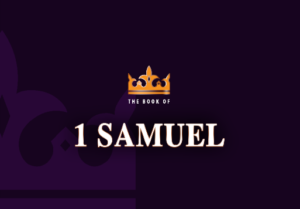 The two books of Samuel tell us of the transition of Israel from a theocracy to a monarchy. Together with the two Books of Kings, the four books form what is titled in the Greek Septuagint and Latin Vulgate translations, “The Book of Kingdoms.” In these books, we see a contrast between the failing rulers of men and the unfailing overrule of God.
The two books of Samuel tell us of the transition of Israel from a theocracy to a monarchy. Together with the two Books of Kings, the four books form what is titled in the Greek Septuagint and Latin Vulgate translations, “The Book of Kingdoms.” In these books, we see a contrast between the failing rulers of men and the unfailing overrule of God.
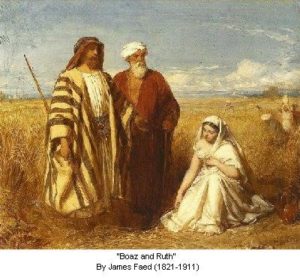 In the Book of Ruth, we witness the fall of the house of Elimelech- (lit. “God is my king”) during the period of the Judges in Israel. Yet the book prophetically hints of the gospel, pointing to the actions of a Kinsman Redeemer, who not only restores the lost inheritance of the Israelites but brings in the Gentile as well.
In the Book of Ruth, we witness the fall of the house of Elimelech- (lit. “God is my king”) during the period of the Judges in Israel. Yet the book prophetically hints of the gospel, pointing to the actions of a Kinsman Redeemer, who not only restores the lost inheritance of the Israelites but brings in the Gentile as well.
The Israelites take further steps away from a theocracy (“God is my king”) in the early chapters of 1 Samuel. Rather than seeking  the mind of their Covenant Keeping Sovereign, they demand an earthly king like the other nations. This king would reign in the place of God.
the mind of their Covenant Keeping Sovereign, they demand an earthly king like the other nations. This king would reign in the place of God.
Sin will always attempt to substitute the false for the true. This is the history of idolatry. G. Campbell Morgan writes, “Every idol is a witness to man’s need of God. The lack of God creates a necessity for putting something in His place.”
In the first book of Samuel, the Israelites are ready to put something or someone else in God’s place so that they can be like the other nations. They ask for a king.
God will use the wayward desires of His people for His purposes. In the Books of the Kingdoms, the reader will see the history of Israel unfold from the vantage point of God’s watchtower through the witness of the prophets appointed as watchmen. Israel will choose a ruler who outwardly appears to fit their estimate of a desirable King. They choose Saul. But God’s choice will not focus on outward appearances but on the inward inclinations of the heart- David. We are given in David a shadow, a faint depiction of what God has in mind of a Shepherd-King for His people- Jesus Christ.
In 1 Samuel, King David is a type of Christ, anointed as King, yet despised and forsaken by his own. In 2 Samuel, the Anointed King of God’s choice will be received by His people.
The Book of 1 Samuel begins with the story of a man who is not after God’s heart- Elkanah. His heart was divided, as illustrated by his relationship with his two wives. In contrast to Elkanah’s failures, we are introduced to the spiritual qualities of his wife Hannah, whose name means “Grace”.
 Hannah was broken-hearted about her condition of barrenness. Although she was favored by her husband, Elkanah, she privately bore a great sorrow in not being able to bear his children.
Hannah was broken-hearted about her condition of barrenness. Although she was favored by her husband, Elkanah, she privately bore a great sorrow in not being able to bear his children.
Barrenness was especially difficult to cope with in Hannah’s day. Children were vitally important to the economic and caring structure of society. (This is true today also). Each generation was dependent upon the next to guarantee the survival of the family business, preserve the family name, pass on the family legacy and maintain the family inheritance. Children were to grow up to be the caregivers and providers for their aging parents.
Not only did Hannah have to battle the social shame of barrenness, but she was also ridiculed by her persistent adversary and rival, her husband’s second wife, Penninah. Whenever she went up to the house of the Lord, Penninah, who was mother to all of Hannah’s husband’s children, provoked her till she wept and would not eat.
Hannah had a God-given longing for fruitfulness. There is a need within each of us to be fruitful. We want to see our lives produce something meaningful, purposeful, beneficial, and lasting. We want to see something significant come to birth in our service and in our relationships.
Jesus spoke of how He was the indispensable key to spiritual fruitfulness: “Remain in me, and I will remain in you. No branch can bear fruit by itself; it must remain in the vine. Neither can you bear fruit unless you remain in me. I am the vine; you are the branches. If a man remains in me and I in him, he will bear much fruit; apart from me you can do nothing.” (John 15:4-5)
“This is to my Father’s glory, that you bear much fruit, showing yourselves to be my disciples.” (John 15:8)
The second man of failure, introduced after Elkanah, is Eli, the priest. Like Elkanah, Eli is the opposite of a man after God’s heart. He is unable to discern the spiritual activity in front of him. He sees lips moving but hears no prayer. He perceives Hannah’s praying as drunken stammering. He makes no effort to minister to her but only gives her his hope that the Lord will answer her request.
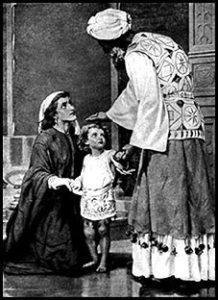 The Lord heard Hannah’s prayer and gave her a son, Samuel, meaning “heard by God” or “asked of God.” She dedicates him to the Lord, according to the vow she made before the Lord in prayer.
The Lord heard Hannah’s prayer and gave her a son, Samuel, meaning “heard by God” or “asked of God.” She dedicates him to the Lord, according to the vow she made before the Lord in prayer.
When the child was fully weaned, Hannah brings him to the Tabernacle in Shiloh. She says to Eli,
1 Samuel 1:27-28 (NASB) 27 “For this boy I prayed, and the LORD has given me my petition which I asked of Him. 28 “So I have also dedicated him to the LORD; as long as he lives he is dedicated to the LORD.” And he worshiped the LORD there.
The boy Samuel worships, and so does his mother. Hannah’s prayer reminds us of Mary’s Magnificat in the New Testament. It is most likely that Mary, the mother of Jesus, recalled Hannah’s prayer when she praised the Lord in Luke 1:46-55. Hannah prays: “My soul exults in the Lord.” Mary praises, “My soul magnifies the Lord! They both praise the Lord for His gift of salvation (Luke 1:47; 1 Sam 2:1). They praise Him for His unique attributes- His holiness (1 Sam 2:2; Luke 1:49) and for the great things He has done (Luke 1:49-52). They both acknowledge that the Lord meets the deepest hunger and greatest needs (Luke 1:53; 1 Sam 2:5). They both praise the Lord for His sovereign and merciful interventions (Luke 1:52, 54-55; 1 Sam 2:4-10). Hannah exults, “The Lord makes poor and rich; He brings low, He also exalts. He raises the poor from the dust. He lifts the needy from the ash heap to make them sit with nobles and inherit the seat of honor (2:7-8)” Mary exclaims: “He has brought down rulers from their thrones and has exalted those who are humble” (Luke 1:52).
Eli’s spiritual dullness is evident in the way he neglects to discipline his children and bring them up in the nurture and admonition of the Lord.
The New Living Translation tells us about Eli’s sons:
1 Samuel 2:12
12 Now the sons of Eli were scoundrels who had no respect for the Lord or their duties as priests.
They treated the offerings that were to be dedicated to the Lord with contempt, selfishly demanding the meat for themselves. While the sons of Eli were serving only themselves, Samuel was “serving the Lord.” Even at his young age, Samuel wore a linen garment like that of a priest. Each year his mother brought him a larger coat as he grew up in the presence of the Lord.
This is an instructive example of a caring mother. Hannah has a greater respect for the priestly office than the priests. She makes appropriate provisions that will accommodate the maturing process of her children.
READING IN THE NEW TESTAMENT
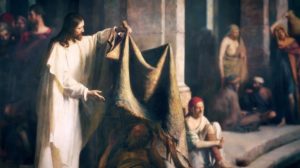 John 5:1-23; Jesus heals the lame man at the pool of Bethesda. He had been sick for thirty-eight years.
John 5:1-23; Jesus heals the lame man at the pool of Bethesda. He had been sick for thirty-eight years.
John uses symbolism that illustrates how Jesus came to his own and his own received him not.
It is interesting that as we come to this next sign-event, John chooses the healing of a man who has been lame the same length of time as the children of Israel were under the law in the wilderness- 38 years.
They were 40 years in the desert, but the law was not given until the second year.
John knew that we are all ‘lame’ under the law.
 Romans 8:3 3 For what the Law could not do, weak as it was through the flesh, God did: sending His own Son in the likeness of sinful flesh and as an offering for sin, He condemned sin in the flesh, 4 so that the requirement of the Law might be fulfilled in us, who do not walk according to the flesh but according to the Spirit.
Romans 8:3 3 For what the Law could not do, weak as it was through the flesh, God did: sending His own Son in the likeness of sinful flesh and as an offering for sin, He condemned sin in the flesh, 4 so that the requirement of the Law might be fulfilled in us, who do not walk according to the flesh but according to the Spirit.
This sign event illustrates the truth found in Romans 8:2
2 For the law of the Spirit of life in Christ Jesus has set you free from the law of sin and of death.
Through the Spirit of the indwelling life of Christ, we can pick up the mat of covenant obligations and carry them, knowing that they are fulfilled through the life of Christ. Our old nature is lame in relationship to the Law of God. It has no ability to please God or fulfill His demands of righteousness. It is not subject to the law of God, “for it is not even able to do so” (Romans 8:7).
Jesus claims once again to be the Son of God.
We forget that prior to Jesus, no one dared call God their Father. To do such, to the minds of the Jewish leaders at the time, amounted to blasphemy. Jesus was claiming equality with God. (John 5:17)
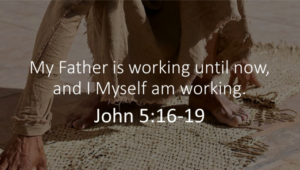 John 5:17 17 But He answered them, “My Father is working until now, and I Myself am working.”
John 5:17 17 But He answered them, “My Father is working until now, and I Myself am working.”
Jesus claims resurrection power and divine authority. He claims that He has been given the authority to judge every human being. He also claims that He is deserving of equal honor and worship as His Father,
John 5:22-23 (NASB) 22 “For not even the Father judges anyone, but He has given all judgment to the Son, 23 so that all will honor the Son even as they honor the Father. He who does not honor the Son does not honor the Father who sent Him.
TODAY’S READING FROM THE BOOK OF PSALMS
Notice that as the Psalmist records the history of Israel, it is not Israel who is acting or being given the glory. The Psalmist boasts in the Lord. He brought His people out of Egypt. He loaded them with silver and gold and kept them from falling. He protected them and guided them with the cloud by day and the fire by night. The cloud mercifully kept them from being scorched by the sun in the wilderness. He fed them and quenched their thirst. He kept His Word and gave His people all He had promised.
When we look back on the history of salvation, and indeed, the history of our salvation we can praise the Lord for the great things He has done!
Salvation is of the Lord! (Jonah 2:9)
PROVERB FOR TODAY:
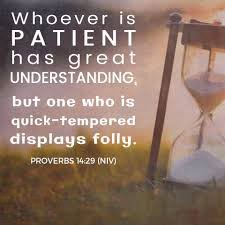 Proverbs 14:28-29 (NASB)
Proverbs 14:28-29 (NASB)
28 In a multitude of people is a king’s glory, but in the dearth of people is a prince’s ruin. 29 He who is slow to anger has great understanding, but he who is quick-tempered exalts folly.
The first of these two proverbs clues us in to people’s preoccupations with popularity polls, particularly political leaders. They glory in the numbers of their supporters, their subjects, their fans. People’s egos are bolstered by counting their online friends and followers. Is this where we find our identity and self-worth? Yet, at the same time, the king, or any leader, must take into account that his or her influence is only effective if there are people within their sphere to receive it.
The second proverb reminds us that the exercise of patience shows understanding. It is also how we gain understanding. To be quick-tempered or literally “hasty of spirit” only brings out one’s foolishness. It is best to be patient with all!
PRAYER FOR THE NATIONS
Ceska Republika
Europe
Geography
Area: 78,864 sq. km
Landlocked central European state.
Population: 10,410,786 Annual Growth: 0.42%
Capital: Prague
Urbanites: 73.5%
HDI Rank: 36 of 182 (UN Human Development Reports 2009)
Peoples
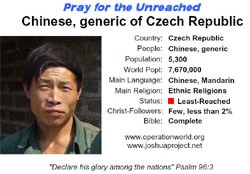 Peoples: 19 (13% unreached) All peoples
Peoples: 19 (13% unreached) All peoples
Unreached Peoples Prayer Card
Official language: Czech Languages: 20 All languages
Religion
Largest Religion: Non-religious
|
Religion |
|
Pop % |
Ann Gr |
|
2,698,476 |
25.92 |
-2.9 |
|
|
72,854 |
0.7 |
0.3 |
|
|
Non-religious |
7,434,342 |
71.41 |
Answer to Prayer
Czech churches now send missionaries to several countries in Europe and around the world. This is an answer to prayer and will hopefully also generate spiritual vitality on the home front.
Challenge for Prayer
The Catholic Church is in what could almost be described as freefall. Despite outnumbering all other confessions nearly 6 to 1, its influence is waning quickly. The openness of the 1990s was a window of opportunity that was passed up. Instead of offering a living faith, traditionalism (“religion for grannies”) and a failure to act decisively relegated Catholicism to a minor role in society – a strong contrast to neighboring Slovakia and Poland. Increasing adaptation and renewal movements may not be enough to save Catholicism from declining further since both laity and priesthood are generally quite old.
PRAYER: O Lord, may we not dishonor our priesthood through self-service. Give us ears to hear and hearts that are swift to obey. We look forward to spiritual growth. We pray that we will outgrow the garments of our spiritual infancy and mature in the grace and knowledge of our Lord and Savior. May we walk in the power of the Holy Spirit, mindful that without You, we are lame on both feet. Grant us the spiritual wisdom, poise, and discretion that will enable us to express Your truth today in love. In Jesus’ Name. Amen.


